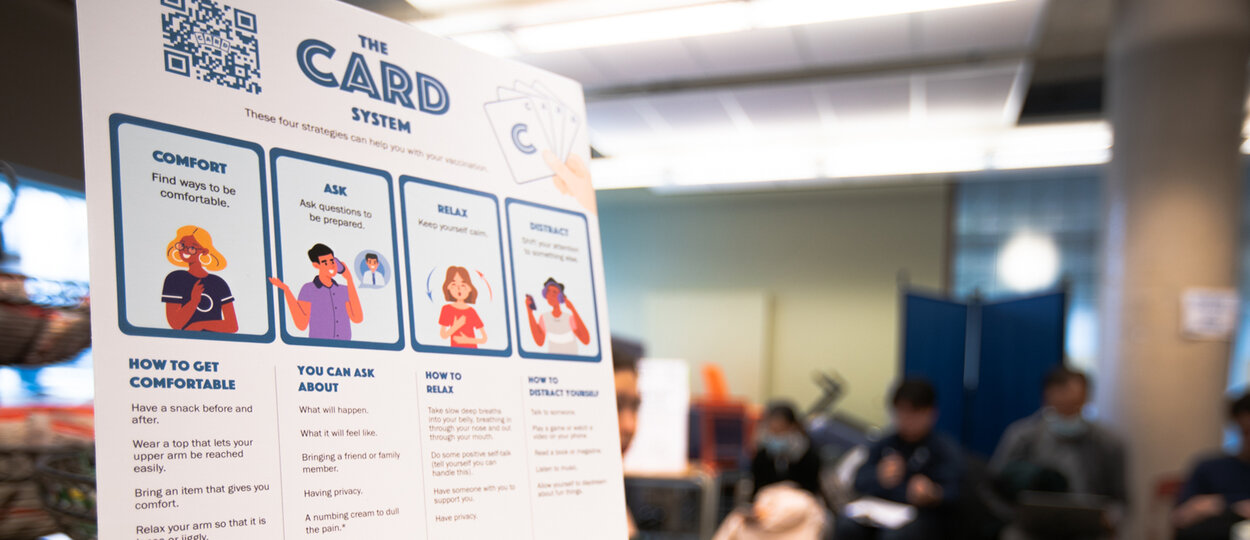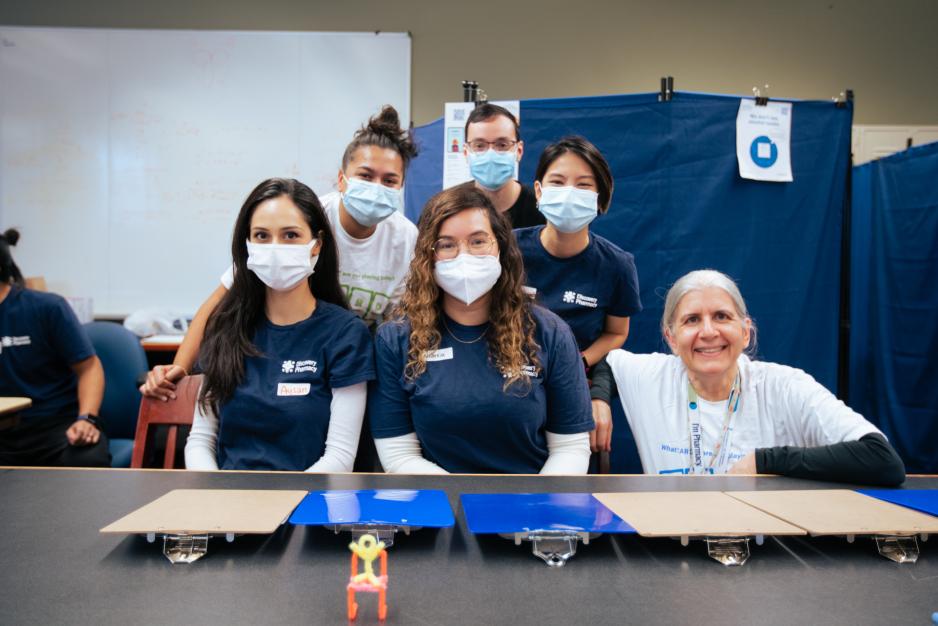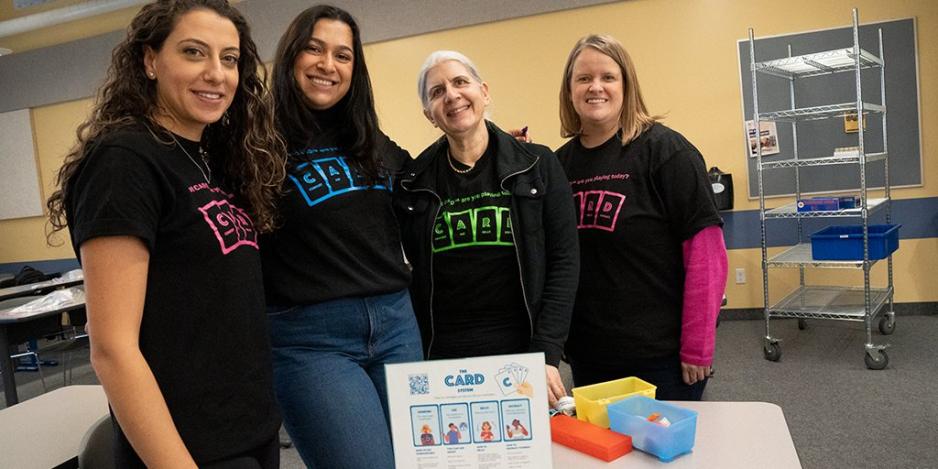Implementing evidence-based CARD system to manage needle fear and pain improved vaccination experience for patients and staff
A partnership between the Discovery Pharmacy and researchers at U of T’s Leslie Dan Faculty of Pharmacy to implement an evidence-based system to manage needle fear improved vaccination experiences for both patients and health care providers in pop-up clinics. The CARD (Comfort, Ask, Relax, Distract) system has now been added to practical training for students in the Doctor of Pharmacy (PharmD) program at the Leslie Dan Faculty of Pharmacy.
“Research shows the importance of pain management in vaccination, but there is still a gap between what the evidence says and what happens in real practice,” says Victoria Gudzak, a PhD student supervised by Anna Taddio, professor at the Leslie Dan Faculty of Pharmacy. “When we embed pain management tools into the education process and students learn about it from the start of their careers, it’s helping to bridge that gap and hopefully more health care providers will feel comfortable providing this patient-centered care moving forward.”
Many people have at least some fear of needles, which can contribute to vaccine hesitancy. In 2022, Taddio, Gudzak and others published a review that found 5 to 13 per cent of parents or children cited fear of needles as their primary reason for not receiving a vaccination.
Several years ago, Taddio and her team developed CARD, which invites patients to participate in their vaccinations and choose from various coping strategies to improve the experience. CARD has been shown to reduce immunization-related stress responses, such as fear and pain across vaccination settings, including schools and pharmacies.
CARD implemented in Discovery Pharmacy pop-up clinics
In the fall of 2022, the Leslie Dan Faculty of Pharmacy’s Discovery Pharmacy hosted four pop-up flu vaccine clinics on the St. George campus. Taddio’s team, including Gudzak, implemented CARD at a series of pop-up clinics and gathered feedback from both patients and immunizers to continually make changes to the clinics to improve the patient experience.
The first day of clinics offered a standard set-up with partial privacy barriers and one waiting area for patients before and after their vaccination. The following three clinics followed the CARD approach with additional privacy for vaccine recipients and separate before and after waiting areas. Other interventions included calming music, distraction items, and a CARD checklist that patients completed at registration to select coping strategies they wanted to use during vaccination.
Patient surveys following the clinics showed improved satisfaction with the vaccination experience compared to prior vaccinationless and less fear in the CARD clinics compared to the standard clinic. After each clinic, the percentage of people who had a positive experience increased, demonstrating the importance of responding to patient and staff feedback.
“This is the benefit of CARD – it works for everybody."
Gudzak notes that it was not just patients who had positive experiences at the CARD clinics, but also the student immunizers. Many commented on how organized and efficient it was, which allowed them to focus on the patients.
“This is the benefit of CARD – it works for everybody. It’s not just about making a patient’s life easier at the expense of an overworked health care provider,” she says. “CARD can eliminate some of the guesswork for the health care providers as CARD incorporates resources to support providers as well as patients.”
Hrag Ashekian, a fourth-year PharmD student, participated as a student immunizer at one of the CARD clinics. Having participated in COVID-19 vaccine clinics, Ashekian says he had developed a “one-size-fits-all” approach and CARD was a valuable reminder of the importance of patient-centred care.
“CARD helped me to realize and appreciate the nuances in patient preferences in terms of receiving vaccine education and receiving the vaccine itself. CARD enabled me to deliver a greater quality of patient-centered care,” says Ashekian. “I found that patients did not shy away from asking questions and were willing to voice their preferences, and I felt as though patients were simply more comfortable. From my experience, the more comfortable the patient, the better the experience.”
PharmD students receive practical training in CARD
PharmD students from the Leslie Dan Faculty of Pharmacy have received training in CARD as part of an injections training course and through a co-curricular activity offered to students who participated in the fall flu pop-up clinics, which provided opportunities for the student immunizers to implement CARD in a real-world practice setting.
The CARD training has been expanded in the Physical Assessment and Injections Techniques course, being included in both modules and assessments. Students now have the opportunity to complete the CARD checklist themselves as a client, during the interaction component of the final assessment where students administer an intramuscular injection.
“It’s important that pharmacy students not only learn proper injection technique but also gain experience with effective provider-patient interactions. We want students to practice supporting people during the injection by using the CARD checklist and considering how to set up vaccination stations, giving them opportunities to get input from patients and follow through on strategies to help ensure needs are being met,” says Natalie Crown, Director of the PharmD Program at the Leslie Dan Faculty of Pharmacy. “Using a CARD checklist during the vaccine experience is one way to ensure patient preferences are being considered and experiencing it as both a patient and vaccinator can be a powerful learning experience.”
Gudzak and other team members have also helped lead CARD training for pharmacy technician students at Humber College. Gudzak says that training the next generation of pharmacy professionals in CARD will support vaccination because the skills they learn will improve relationships with patients.
“Needle fear and pain are common concerns during vaccination. CARD is an effective and feasible way of reducing these reactions and making vaccinations less stressful for everyone,” says Gudzak. “It was amazing to see that as we continued to work as a team, refine our practices and get better at providing this care, it made for a better experience for everyone involved.”
CARD Implementation: Results from Discovery Pharmacy Vaccine Pop-up Clinics
More News
Image

Faces of PharmSci: Mahya Rezaeifarimani
Supervised by Prof. Shirley Wu, PhD student Mahya Rezaeifarimani is developing smart nanoparticles to help make radiation therapy work better for brain tumours by targeting low-oxygen areas that often make treatment less effective.
Read More
Image

Dean Lisa Dolovich reappointed for second term
Professor Lisa Dolovich has been reappointed for a second term as Dean of the Leslie Dan Faculty of Pharmacy, University of Toronto, effective July 1, 2025, to December 30, 2030.
Read More
Image

Pharmacy Summer Camp gives high school students insight into pharmacy profession
A new summer camp based at the faculty will give high school students a range of experiences in pharmacy and pharmaceutical sciences.
Read More


